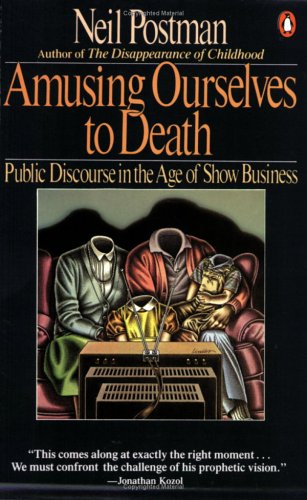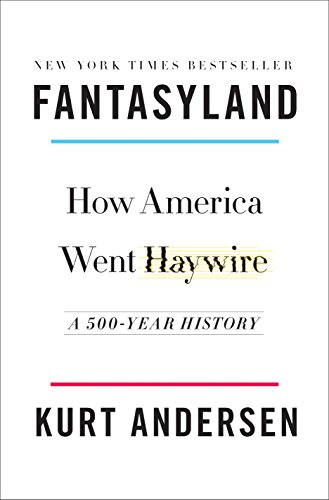Amusing Ourselves to Death - Neil Postman
Thursday 25 October 2018 This book had spent several years on my "to read" list before I finally got around to reading it, and it exceeded my expectations. I was shocked that this book had been written in 1985 as it is even more relevant to the world today than I suspect it was at the time.
This book had spent several years on my "to read" list before I finally got around to reading it, and it exceeded my expectations. I was shocked that this book had been written in 1985 as it is even more relevant to the world today than I suspect it was at the time.
The book is about how mass media and communication technology have fundamentally changed our culture, and specifically how the culture has shifted to having the production of entertainment as the chief driver of society and how this effects the way people obtain and process information.
As of this writing the story about the murder of journalist Jamal Kashoggi has been the top news story for the last three weeks straight. While the story is a tragedy, it also happens to be close to the perfect news story for cable news:
- It evokes outrage and anger that a journalist can be murdered in such a manner.
- It is unlikely that any meaningful new information will come out.
- There is really nothing anybody can do about it.
- It doesn't really affect most consumers of Western news in any way.
As has recently been demonstrated through the social media issues around politics, the best way to engage people is with a story that evokes moral outrage and condemnation. This one is especially good because, despite the efforts of certain US government officials, it is very difficult to take a position that what happened was not horrible and inexcusable. This means that this story isn't going to alienate half of the US market that may have differing political views. The fact that it is unlikely that any new information will arise allows the story to be drawn out indefinitely. The fact that there is really not much that can be done to right the wrong prevents the story from reaching a natural conclusion, which also allows it to be kept in breaking news as long as the media desires.
The fourth point, about how this story doesn't really affect most people in any way is something that is discussed in the book. According to Postman, before the telegraph most news was local news. Without the ability to transmit information instantaneously across countries or oceans the news that mattered to people were things that actually mattered - things that will have direct impact on people. If the news is about things that actually effect your life, people will presumably have a greater context to put the day's news into.
Democracy in America was based on the assumption that people would learn about the issues, figure out their opinion on policies, and vote for representatives that would implement the preferred policies of the voters. Mass media threw a major monkey wrench into this because after the telegraph was invented news was no longer about local events but became a smattering of isolated and context-free factoids which have little to no bearing on the lives of most people. After the Fairness Doctrine was revoked in the 1980s, the news became solely about entertaining people in order to sell more advertisements and any pretense of serving a greater good largely disappeared. As this culture of entertainment grew we are now at the point where policies are largely irrelevant to political campaigns which seem to be mostly fueled by tribal divisions. Rather than picking my candidate based on which person's policies are closest to mine, I pick my candidates based on what political tribe I identify with, and if I even think about policies, I just pick whatever my chosen party espouses. No thought is required at all, I get all my opinions from cable news and if facts contradict my chosen position I can just discount them.
Similarly, the theoretical underpinning of free market capitalism is that consumers will get information about the various choices they have and make an informed decision based on that information. Companies are supposed to thrive or fail based on how well they cater to the needs of consumers. However with the advent of propaganda-style advertisement (where the advertisment contains little to no factual advertisment about the product being offered), corporations found a shortcut. Rather than improving their products to make them more attractive to consumers, it is usually easier and more cost effective to convince the consumers that they want your product regardless of any factual information about it. Today's advertising doesn't try to provide information, it tries to associate a feeling with the product, convincing you that you will be happier or a better person just by having the product. A "brand identity" has nothing to do with any attributes of products and everything to do with trying to convince people that certain types of people purchase that brand and if you buy that brand you, too, can be one of those people.
I have recently been wondering about how the ubiquitousness of TV has affected society. I imagine that before TV was in every house people learned how to behave and what to believe from the people around them. No one wants to watch normal people doing normal everyday things on TV, so everything must be dramatized and distorted for maximized entertainment value. I speculate that this could cause a feedback cycle where the real world emulates what it sees on TV and the movies, and entertainment then needs to exaggerate the real world more and more to keep itself interesting. While I have no concrete evidence for this hypothesis it seems to evidence itself in the quality of American entertainment, and it seems to be speeding up.
If only the world had listened to Mr Postman sooner.
Labels:
books,
politics
No comments
 I was familiar with the case of Edgardo Mortara from having read Henry Charles Lea's "History of the Inquisition of the Middle Ages" and I am very interested by the subject of the crazy things that are often done in the name of religion, so when I found out that this case had an entire book written about it I was anxious to read it.
I was familiar with the case of Edgardo Mortara from having read Henry Charles Lea's "History of the Inquisition of the Middle Ages" and I am very interested by the subject of the crazy things that are often done in the name of religion, so when I found out that this case had an entire book written about it I was anxious to read it. The subject of this book is something I think about quite a bit - how Americans will pretty much believe anything, no matter how ridiculous. It may sound somewhat similar to "Bunk", but the books are completely different. While "Bunk" focuses on the hoax as a sort of benign joke, this book is more about how people are completely indifferent to facts of any sort.
The subject of this book is something I think about quite a bit - how Americans will pretty much believe anything, no matter how ridiculous. It may sound somewhat similar to "Bunk", but the books are completely different. While "Bunk" focuses on the hoax as a sort of benign joke, this book is more about how people are completely indifferent to facts of any sort.